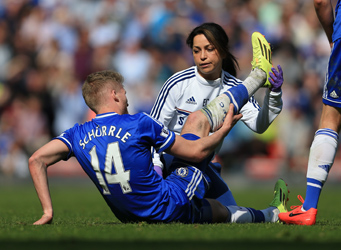Speak to most Arsenal supporters and, anecdotally, they’ll assure you that our fanbase was one of the first to tackle in-house racism. The reasons given for this vary. Some say it’s because of the club’s inclusive policy on the pitch. Arsenal’s first black player, Brendon Batson, turned out for the club in 1971. To put this in context, Viv Anderson didn’t win his senior cap for England until 1978, Howard Gayle didn’t make an appearance for Liverpool until 1977, while Paul Canoville didn’t play for Chelsea until 1981. By the late ’80s, the Arsenal side was, of course, hugely mixed; Paul Davis, Rocky Rocastle, Michael Thomas and Kevin Campbell all became crucial players for the club. Since then, footballers of all origins have played at Highbury and the Emirates – too many to mention. All these players represented integration on the pitch, many became heroes on the terraces; accordingly, or so the anecdotes go, racism died a death amongst the fans.
Others would claim that supporters from minority backgrounds made the difference themselves. Folk legends like Dainton Connell are said to have made a big impact on fellow Gunners, advertently or inadvertently. This may have kept overt discrimination from the stands; Connell is meant to have done so quite literally, stamping out any hint of racist literature at Highbury – and at a time (in the ’70s and ’80s) when it was still freely distributed at other grounds by organisations like the National Front and the BNP.
Add to these anecdotes the general ethnic mix of North London, plus the social, religious and political variety of Highbury, Islington, Camden, Haringey, Barnet, Enfield, Wembley and so on – of all the local areas that support our fanbase – and I think the picture of Arsenal’s enduring inclusivity becomes clear. The fans and the club have long been diverse and, by and large, our reputation on this front is a good one. That’s something I, and the vast majority of others, are proud of.
More recently, Arsenal fans have been some of the first to tackle other forms of discrimination. The Gay Gooners are a pioneering group of LGBT and pro-LGBT supporters established in early 2013; they’ve worked with the club to campaign against footballing homophobia, they’ve added their banner to the many others draped over the Emirates and they have – again, by and large – received an encouraging reaction at the stadium and beyond. Likewise, the Emirates feels like a particularly welcoming arena for female fans. This might be my own form of anecdote but, as far as I can tell, the crowd is conspicuously and increasingly mixed in terms of gender; there must be multiple factors in this but, to speculate, it may well be chiefly down to the fanbase’s open and welcoming approach elsewhere. Taken altogether, all of this contributes to Arsenal’s massive popularity. All of this equates to a club that, to reiterate, makes us proud.
This is perhaps why it felt like a genuine shock to see Arsenal fans cited, amongst others, in last week’s Premier League sexism storm. Footage obtained by the BBC revealed that a small but vocal group of away supporters directed graphic abuse at Chelsea club doctor Eva Carneiro during this season’s match at Stamford Bridge. With one bloke filming, and a crowd of others chanting, she, as a top-flight medic trying to do her job, was met at the side of the pitch with loud and doubtlessly audible chants of ‘Have you ever had a Gooner up you’re a**e?’.
I’ll be the first to say that I find this acutely embarrassing – and absurd. It’s embarrassing because it gives a terrible account of Arsenal fans, and an extremely public one. It’s absurd because it goes against that inclusivity which has come to characterise the club.
How many female Arsenal supporters were within earshot of the chanting, and how many of them – our own fans – felt intimidated or unhappy with it? How many of those doing the chanting have gone to games with their wives, girlfriends, mothers, sisters and daughters et cetera – and how many think that those women would have appreciated their behaviour? Similarly, how many of those blokes realise that Arsenal have one of the most successful female football teams in the world, and that women have made as much of a contribution to Arsenal on the pitch as they have off it? The thoughtlessness of their conduct is almost unbelievable.
This is not to say that such an incident makes any difference to the overall ethos of the fans. Those caught abusing Carneiro represent a miniscule minority of those who support Arsenal. However, they have personally dragged the club into the media narrative of sexism in football. It is possible that, owing to their stupidity, perceptions of Arsenal fans from the outside might change.
Considered alongside reports that a group of supporters sang homophobic songs during Arsenal’s 2013 FA Cup tie with Brighton, as well as occasional, isolated accounts of racism – no one set of fans is entirely free of it – this sort of incident becomes more than just a blot on the fanbase’s admirable record; it becomes a threat to Arsenal supporters’ longstanding reputation. That reputation is well-loved, hard-earned and built on years of open, non-discriminatory attitudes. Nevertheless, it might only take a few well-publicised wrongs to do it lasting damage.
Twitter@W_F_Magee







